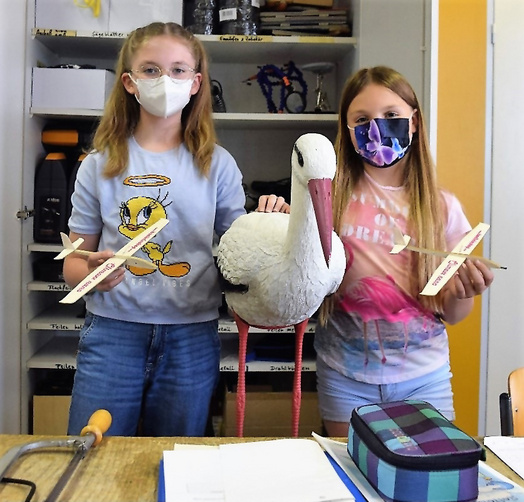Fun at school: students test model aircraft and building instructions
A group of German students aged 11 to 13 years old tested building instructions of beginners’ model aircraft and their flight behaviour as part of their school curriculum.
Organised by the Höchstadt/Aisch grammar school in Bavaria, Germany, the project aimed at furthering the students’ knowledge in consumer education, a compulsory subject of the economics and law course. It was undertaken in the fun environment of aeromodelling as part of the optional curriculum subject of technical experimentation, aeronautics and space education.

Origins and scope
The project came to life through the initiative of Stiftung Warentest, an independent German consumer organisation, which offered participation to schools through a national call for proposals. This year, 800 test projects were submitted by young people and their schools.
The challenge was taken up by teachers Klaus Strienz, Achim Engelhardt and Tobias Kanzler.
For Klaus Strienz, who served over 10 years as a Delegate of the German Aero Club to the FAI Education Commission, it has been a unique opportunity to share his passion for and knowledge of air sports with his students.
He said: "The success of this project and the enthusiasm of the students show that aeromodelling and air sports are a great way to address school topics in a fun environment."
The students participating were nicknamed the "Young Storks" because the Höchstadt and Aisch valley is a centre for storks in Franconia/Bavaria. They had all chosen the optional subject "Technical ExperiMINTieren" of the MINT Excellence School. MINT stands for intensive curricula in mathematics, informatics, natural sciences, technology. The team worked on this project from 2020 to 2022, despite the pandemic and the school closures.
Klaus Strienz said: "The students were highly motivated during the project and could see by themselves that when building or using products, difficulties can be caused by inadequate instructions for use, and not necessarily by the consumers’ inexperience. As a supervior, I had the impression that none of the building instructions times had been tested with the target group before the models hit the shelves; as if they had been written by engineers without any pedagogical considerations."
The project's main phases
The Stiftung Warentest/Jugend call for creativity and structured work that is documented and evaluated. Therefore the students worked on the development of a standardised test sheet. Information was given to the parents directly and to a wider audience through the school's annual report.
Next, the “Young Storks” contacted the companies and organisations selling or offering model aircraft for beginners.
Aero-naut, Himmlischer Höllein, in cooperation with Bayerischer Luftsportverband (member of NAC DAeC) and the German Model Pilot Association (DMFV) gave them positive answers, thus allowing the launch of the experimental and testing phase.
The last phase of the project consisted in summarising the data and finally in sending the project report to the teachers - all on time!
A summary of the results will be sent to Stiftung Warentest in the summer when the Stiftung Warentest panel's evaluation will be made available. Without any doubt, the students' "report cards" will be valuable for the improvement of the products.
Findings and challenges
- When creating the checklists and catalogue of criteria for the testing procedures, the students recalled their experiences with poor quality instruction manuals leading to frustration and malfunctioning of the products. These experiences were used in the editing of the test sheets
- One product even had to be excluded from the test procedure because the manufacturer supplied lead as a counterweight for finding the correct centre of gravity. The use of the lead has been banned in Bavarian schools for several years for its negative impact on the environment
- Teamwork when assembling the flying objects is essential (when you realise your neighbour is more important than the building instructions...)
- Error or unclear instructions and/or sketches can cause a lot of frustration
- The written aids for the flight phases offered by the manufacturers for flying can be improved
Beyond Germany
Klaus Strienz added: "Other schools outside of Germany could easily take this project up, since the beginners’ model aircraft available on the market are often different from one FAI member country to the other. Of course, we would be more than happy to provide anyone with our test sheet and help develop them further."


